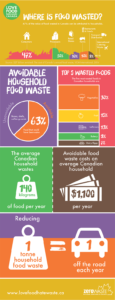Sixty-three per cent of the food Canadians throw away could have been eaten. Not knowing how to use up leftovers or less than perfect foods are leading reasons for food waste in Canadian households – but now Canadians can find simple, intuitive tips to store, prepare, and creatively use up commonly wasted food items and keep them out of the compost or garbage.
The new Love Food Hate Waste Canada campaign, “5 Ways With”, aims to help Canadians rethink avoidable food waste from bread crusts and broccoli stalks to bruised apples and ripe tomatoes.

“Food waste is a global, but solvable problem and the good news is, we know that Canadians are more motivated than ever to reduce their food waste,” said Jack Froese, chair of the National Zero Waste Council.
“A consumer insight survey conducted in 2020 showed that 84 per cent of Canadians agreed that food waste is an important national issue and 94 per cent of Canadians were motivated to reduce their food waste. The ‘5 Ways With’ website provides Canadians with the tools to act and prevent food waste in the home.”
Delivered by the National Zero Waste Council in conjunction with its partners, Love Food Hate Waste Canada campaigns are the leading national education and awareness platforms about household food waste issues in Canada.
Research conducted by the National Zero Waste Council found that each year Canadian  households throw out almost 2.2 million tonnes of edible food. For the average Canadian household that amounts to 140 kilograms of wasted food per year, at a cost of more than $1,100 per year.
households throw out almost 2.2 million tonnes of edible food. For the average Canadian household that amounts to 140 kilograms of wasted food per year, at a cost of more than $1,100 per year.
“Preventing food waste becomes intuitive once you learn a few of the tricks,” says Bob Blumer, Chef, Author, and passionate Food Waste Ambassador with Love Food Hate Waste Canada. “This spring I will be sharing some of my top food-saving tips for fun, easy ways Canadians can significantly reduce food waste in their own kitchens.”
The campaign is being delivered by the National Zero Waste Council in collaboration with 11 campaign partners, including the City of Toronto, City of Vancouver, City of Victoria, Guelph-Wellington, City of Winnipeg, RECYCQUÉBEC, the Capital Regional District, Metro Vancouver, BC Ministry of Environment and Climate Change Strategy, and two major Canadian food retailers, Walmart Canada and Sobeys Inc.
For further information on this campaign, and for food waste prevention resources, click here.








